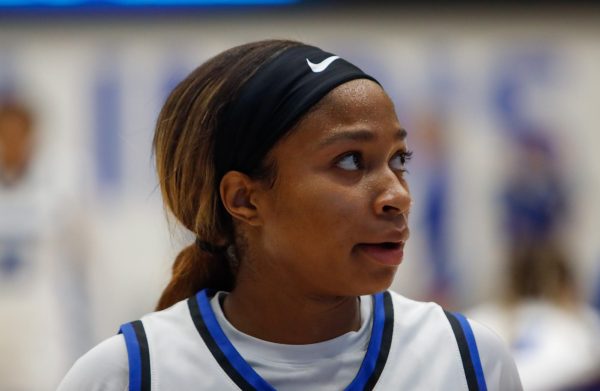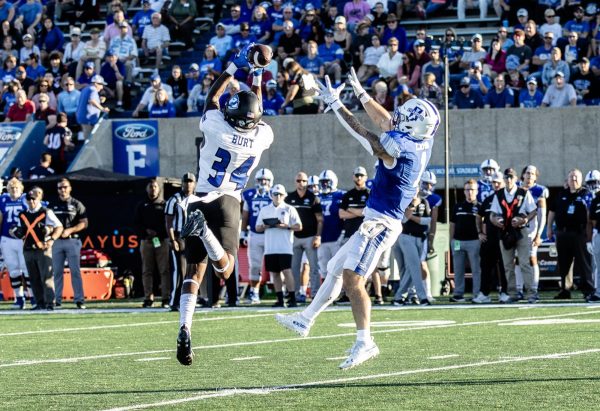Quick adjustment to college
Ogechi (pronounced Oh-Gay-Chee) Nwordu has a lot in common with other freshmen on campus.
She lives in a dorm, goes to class, is afraid of the dark and hates the cold weather. Violet, as she is known around here, is a member of the women’s track team. Like many athletes, before Nwordu was recruited to Eastern, she did not even know it existed and still cannot find Charleston on a map.
But Nwordu has a background quite unlike the average freshman.
She was born in Nigeria, in a small village called Ndashi. There were seven huts and around 30 adults living there.
“You would see a big block of woods and then another village,” Nwordu said. “The other villages were a little bit bigger.”
Her native language is Ebo. When she moved to Houston at age 10, she had to learn “everything,” she said.
“I don’t think it took me more than two months to learn English,” Nwordu said. “I think English is the easiest language in the whole entire universe.”
However the rest of her early adjustment was not so easy. She found herself across the world and alone.
“When I came here they put me back in the fifth grade because I couldn’t speak English; I had a horrifying 10th grade until high school experience,” she said. “People don’t know what it’s like to be from a different place, what it’s like to be different.”
Nwordu was the only black person in an all-Hispanic school. Even talking about this early time is still very hard for her today.
She persevered and made it to West Side High School in Houston where she began to be involved in sports.
“The number one reason to join up sports for me was to not be alone, I hate being alone,” she said. “I would be at school after everyone had gone home, still practicing.”
Nwordu had practice from 3-6 p.m. and then went to a club track team’s practice until 9 p.m.
If you ask her what she runs, she’ll tell you she doesn’t really know.
She began her high school career in the mile and two mile races, building up endurance. Then her sophomore year she asked the coaches to put her in a sprint race.
Micki Karacek, one of Nwordu’s track coaches in high school, said Nwordu started out slowly. When she entered the track program she had no experience.
“It took her a while to come around, ” Karacek said. “But she was wonderful, a hard worker, she came to practice and did whatever was asked of her.”
After working hard and improving dramatically, Nwordu was recruited for a club track team and the shorter races began to appeal to her.
“I really wanted to run the 200-meter dash. I told my summer track coach I liked it,” Nwordu said. “He told me to tell my school coaches, and after I ran it, they kept saying ‘do you know what you just did? Do you know what you just did?'”
She ran so well that she became one of her team’s top sprinters.
She likes the shorter races because they finish quick, and said that she is now spoiled and will never run the mile again.
From then until the end of her high school career she focused on the 200- and 400-meter races. Now at Eastern she has been thrown into the 60-meter dash as well.
“It’s over as soon as the gun pops,” she said.
The coaches don’t mind either. Her times are some of the fastest on this year’s roster.
“If you put me in something I think I will be able to give you my best,” Nwordu said in reference to the challenges of running a variety of races. “When I run, if I’m not in the position I want to be, I’m not happy at all. If I have one bad race, I take the anger and put it into the next one.”
Nwordu comes from a background of very intense competition. She knows there is always somebody faster, so she is always pushing for more.
“I hate feeling like I could have run harder. If my time drops, that’s good. If I get a first place but a bad time, I am embarrassed,” Nwordu said.
Nwordu has always wanted to be one of the “good people, the ones you remember.”
“I want those (freshmen) who come next to have to work harder (to beat her records),” she said.
Nwordu likes competition and has been accepting challenges since she was a child. When the boys wanted to race her in grade school she said, “Let’s go.”
When coaches tell her that her time is not where it needs to be, she will run for the new goal.
Her father, Akahmbari Nwordu, describes his daughter as young, vibrant, and a very nice young lady, who has a lot ahead of her.
“I am most proud of her courage and determination,” he said.
Nwordu’s goal for her college career is to become an algebra teacher because of the challenges it offers, she said.
As far as track, she wants to place well at conference this weekend in Nashville, Tenn., and run a 57-second leg in the 4 x 400.
Nwordu wants to let other schools know that Eastern still has a sprinter to look out for despite the absence of Alicia Harris from the roster.
She has moved across an ocean, learned a new language, survived the cruel world that can be middle and high school and is now adjusting to a challenge many students at Eastern face – living at college.





































































